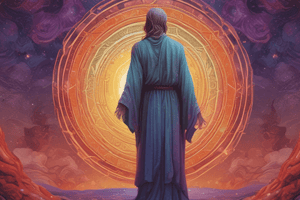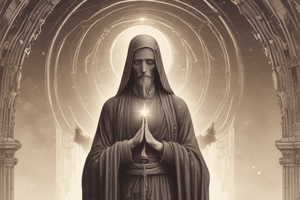Podcast
Questions and Answers
Religious experience may mean a personal experience that pertains to an encounter of the ______
Religious experience may mean a personal experience that pertains to an encounter of the ______
Sacred
According to William James, religious experience is described as ______ and transcends normal physical experience.
According to William James, religious experience is described as ______ and transcends normal physical experience.
transcendental
Religious experience blocks everything away, focusing your attention solely on that particular ______.
Religious experience blocks everything away, focusing your attention solely on that particular ______.
experience
The term 'religious' may refer to ______ and to something holy or sacred.
The term 'religious' may refer to ______ and to something holy or sacred.
In modern society, claiming to have encountered God may lead others to perceive you as ______ or delusional.
In modern society, claiming to have encountered God may lead others to perceive you as ______ or delusional.
The term 'religious' may also refer to a set of ______.
The term 'religious' may also refer to a set of ______.
Religious experience is often seen as an encounter of the ______.
Religious experience is often seen as an encounter of the ______.
William James is known for making contributions in the field of philosophy of ______.
William James is known for making contributions in the field of philosophy of ______.
When experiencing something religious, individuals may feel a connection to the ______.
When experiencing something religious, individuals may feel a connection to the ______.
In modern society, discussing religious experiences can be challenging due to advancements in ______ and technology.
In modern society, discussing religious experiences can be challenging due to advancements in ______ and technology.
Flashcards are hidden until you start studying
Study Notes
Understanding Religious Experience
- "Religious experience" combines two terms: "religious," relating to the divine and sacred, and "experience," referring to personal and subjective life events.
- William James distinguished between normal and religious experiences, classifying the latter as transcendental and isolating, focusing attention solely on the divine.
- Religious experiences can be challenging to express in modern society, as they may be perceived as delusions or mental health issues.
- Rudolf Otto emphasized that religious experiences require effort to recognize and are often unnoticed when they occur.
- Transformative power is a key aspect of religious experiences, influencing individuals' commitments to their faith.
- Historical examples include:
- St. Paul's transformative encounter on the road to Damascus, pivotal in spreading Christianity.
- Siddhartha Gautama's attainment of Nirvana, which led to Buddhism's formation.
- Jayjay Helterbrand's recovery from addiction through a miraculous event involving his daughter.
- Manny Pacquiao's spiritual journey and transformation.
Defining Spirituality
- Spirituality differs from several concepts:
- Not spiritism, which involves beliefs about spirits haunting the living.
- Not spiritualism, which endorses communication with the dead.
- Not mesmerism or hypnotism, which involve manipulation of consciousness.
- Not religiosity, which is external, focused on traditions and practices of religion.
- Spirituality is centered on the spirit or soul, viewed as an embodiment of both body and spirit.
- Sawan Ashram describes spirituality as a journey toward higher consciousness and understanding the divine plan.
- Spirituality encompasses self-realization and God-realization, seeking meaning beyond the physical realm.
- The pursuit of spirituality may exist independent of religion, although their practices together can enhance growth.
- The phrases "religious but not spiritual" and "spiritual but not religious" highlight the importance of a balanced approach, where spirituality enriches religious practice, and religion guides spiritual exploration.
Understanding Religious Experience
- "Religious experience" combines two terms: "religious," relating to the divine and sacred, and "experience," referring to personal and subjective life events.
- William James distinguished between normal and religious experiences, classifying the latter as transcendental and isolating, focusing attention solely on the divine.
- Religious experiences can be challenging to express in modern society, as they may be perceived as delusions or mental health issues.
- Rudolf Otto emphasized that religious experiences require effort to recognize and are often unnoticed when they occur.
- Transformative power is a key aspect of religious experiences, influencing individuals' commitments to their faith.
- Historical examples include:
- St. Paul's transformative encounter on the road to Damascus, pivotal in spreading Christianity.
- Siddhartha Gautama's attainment of Nirvana, which led to Buddhism's formation.
- Jayjay Helterbrand's recovery from addiction through a miraculous event involving his daughter.
- Manny Pacquiao's spiritual journey and transformation.
Defining Spirituality
- Spirituality differs from several concepts:
- Not spiritism, which involves beliefs about spirits haunting the living.
- Not spiritualism, which endorses communication with the dead.
- Not mesmerism or hypnotism, which involve manipulation of consciousness.
- Not religiosity, which is external, focused on traditions and practices of religion.
- Spirituality is centered on the spirit or soul, viewed as an embodiment of both body and spirit.
- Sawan Ashram describes spirituality as a journey toward higher consciousness and understanding the divine plan.
- Spirituality encompasses self-realization and God-realization, seeking meaning beyond the physical realm.
- The pursuit of spirituality may exist independent of religion, although their practices together can enhance growth.
- The phrases "religious but not spiritual" and "spiritual but not religious" highlight the importance of a balanced approach, where spirituality enriches religious practice, and religion guides spiritual exploration.
Studying That Suits You
Use AI to generate personalized quizzes and flashcards to suit your learning preferences.




